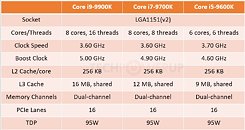- Joined
- Oct 9, 2007
- Messages
- 47,438 (7.50/day)
- Location
- Hyderabad, India
| System Name | RBMK-1000 |
|---|---|
| Processor | AMD Ryzen 7 5700G |
| Motherboard | ASUS ROG Strix B450-E Gaming |
| Cooling | DeepCool Gammax L240 V2 |
| Memory | 2x 8GB G.Skill Sniper X |
| Video Card(s) | Palit GeForce RTX 2080 SUPER GameRock |
| Storage | Western Digital Black NVMe 512GB |
| Display(s) | BenQ 1440p 60 Hz 27-inch |
| Case | Corsair Carbide 100R |
| Audio Device(s) | ASUS SupremeFX S1220A |
| Power Supply | Cooler Master MWE Gold 650W |
| Mouse | ASUS ROG Strix Impact |
| Keyboard | Gamdias Hermes E2 |
| Software | Windows 11 Pro |
Intel is giving finishing touches to its 9th generation Core processor family, which will see the introduction of an 8-core part to the company's LGA115x mainstream desktop (MSDT) platform. The company is also making certain branding changes. The Core i9 brand, which is being introduced to MSDT, symbolizes 8-core/16-thread processors. The Core i7 brand is relegated to 8-core/8-thread (more cores but fewer threads than the current Core i7 parts). The Core i5 brand is unchanged at 6-core/6-thread. The three will be based on the new 14 nm+++ "Whiskey Lake" silicon, which is yet another "Skylake" refinement, and hence one can't expect per-core IPC improvements.
Leading the pack is the Core i9-9900K. This chip is endowed with 8 cores, and HyperThreading enabling 16 threads. It features the full 16 MB of shared L3 cache available on the silicon. It also has some stellar clock speeds - 3.60 GHz nominal, with 5.00 GHz maximum Turbo Boost. You get the 5.00 GHz across 1 to 2 cores, 4.80 GHz across 4 cores, 4.70 GHz across 6 to 8 cores. Interestingly, the TDP of this chip remains unchanged from its predecessor, at 95 W. Next up, is the Core i7-9700K. This chip apparently succeeds the i7-8700K. It has 8 cores, but lacks HyperThreading.

The Core i7-9700K is an 8-core/8-thread chip clocked at 3.60 GHz, but its Turbo Boost states are a touch lower than those of the i9-9900K. You get 4.90 GHz single-core boost, 4.80 GHz 2-core, 4.70 GHz 4-core, and 4.60 GHz across 6 to 8 cores. The L3 cache amount is reduced to the 1.5 MB per core scheme reminiscent of previous-generation Core i5 chips, as opposed to 2 MB per core of the i9-9900K. You only get 12 MB of shared L3 cache.
Lastly, there's the Core i5-9600K. There's far too little changed from the current 8th generation Core i5 parts. These are still 6-core/6-thread parts. The nominal clock is the highest of the lot, at 3.70 GHz. You get 4.60 GHz 1-core boost, 4.50 GHz 2-core boost, 4.40 GHz 4-core boost, and 4.30 GHz all-core. The L3 cache amount is still 9 MB.
The three chips are backwards-compatible with existing motherboards based on the 300-series chipset with BIOS updates. Intel is expected to launch these chips towards the end of Q3-2018.
View at TechPowerUp Main Site
Leading the pack is the Core i9-9900K. This chip is endowed with 8 cores, and HyperThreading enabling 16 threads. It features the full 16 MB of shared L3 cache available on the silicon. It also has some stellar clock speeds - 3.60 GHz nominal, with 5.00 GHz maximum Turbo Boost. You get the 5.00 GHz across 1 to 2 cores, 4.80 GHz across 4 cores, 4.70 GHz across 6 to 8 cores. Interestingly, the TDP of this chip remains unchanged from its predecessor, at 95 W. Next up, is the Core i7-9700K. This chip apparently succeeds the i7-8700K. It has 8 cores, but lacks HyperThreading.

The Core i7-9700K is an 8-core/8-thread chip clocked at 3.60 GHz, but its Turbo Boost states are a touch lower than those of the i9-9900K. You get 4.90 GHz single-core boost, 4.80 GHz 2-core, 4.70 GHz 4-core, and 4.60 GHz across 6 to 8 cores. The L3 cache amount is reduced to the 1.5 MB per core scheme reminiscent of previous-generation Core i5 chips, as opposed to 2 MB per core of the i9-9900K. You only get 12 MB of shared L3 cache.
Lastly, there's the Core i5-9600K. There's far too little changed from the current 8th generation Core i5 parts. These are still 6-core/6-thread parts. The nominal clock is the highest of the lot, at 3.70 GHz. You get 4.60 GHz 1-core boost, 4.50 GHz 2-core boost, 4.40 GHz 4-core boost, and 4.30 GHz all-core. The L3 cache amount is still 9 MB.
The three chips are backwards-compatible with existing motherboards based on the 300-series chipset with BIOS updates. Intel is expected to launch these chips towards the end of Q3-2018.
View at TechPowerUp Main Site






